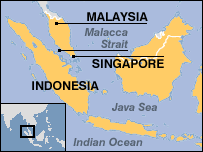
The recent seizure of a giant oil tanker off Somalia may be one of the most audacious recent attacks by pirates, but for people here in South East Asia, it's an old and familiar story.
Malaysia and its neighbours are stepping up anti-piracy efforts
The journals of James Brooke, the famous "White Rajah of Sarawak", who governed part of Borneo in the 19th century give a sense of the age of the problem.
He recounted his attempts to wipe out piracy in the region, describing pitched battles along the coastlines between the British navy and the fleets of tribal longboats that preyed on shipping.
It's the stuff of adventure books.
But for some coastal villages tucked away among the thousands of islands that make up Indonesia, Malaysia and the Philippines, piracy has been a way of life for generations.
Bows and poisoned arrows have given way to automatic weapons and grenades, and the busier the trade routes have become, the richer the pickings.
The narrow waterways between Malaysia and Indonesia - the Straits of Malacca and Singapore - are now among the busiest shipping lanes in the world, accounting for 40% of global trade.
As the shortest route between the Indian and Pacific Oceans, they are crowded with tankers taking oil to Japan and China, and container ships bringing goods back the other way to their markets in the West - some 70,000 vessels last year.
Joint efforts
By 2005, pirate attacks in the Straits were happening almost weekly and Lloyds of London began classifying the waters as a war zone.
Insurance premiums soared and the region's governments were forced to take aggressive action.
The navies of Singapore, Malaysia and Indonesia began co-ordinated air and sea patrols, and pirate organisers in Indonesia and Malaysia were arrested and punished, thanks to improved intelligence and policing on shore.
So far, the campaign has been largely successful.
Monitors at the International Maritime Bureau have recorded only two attacks this year, compared with about 40 in 2004.
The Straits and neighbouring waters have now been relegated to third on the IMB's pirate warning list, after the Gulf of Aden and Somalia and the waters off Nigeria.

Experts also point to other factors, such as the surge of aid money after the 2004 Asian tsunami, which helped some poor communities that might otherwise have been tempted into piracy.
But there is evidence the problem may be moving elsewhere in the region.
The remote eastern islands of Indonesia and the southern Philippines have seen a rise in attacks.
The Sulu and Celebes Seas, also part of the route used by giant oil tankers, have been called by one researcher an "ungoverned maritime space".
Islamic insurgents in the southern Philippines have used piracy and smuggling to fund their activities in the past, and there is a fear that events off Somalia may encourage them, or others in the region, to try something more ambitious.
Source: http://news.bbc.co.uk/2/hi/business/7753991.stm, 08 Dec 2008
No comments:
Post a Comment